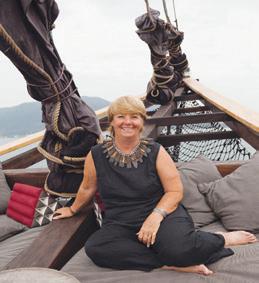
15 minute read
Patti Seery & her Silolona Sojourns legacy
Patti Seery aying Homage toP
In this issue, we pay tribute to Patti Seery, founder and owner of the world class private charter phinisi operator Silolona Sojourns, who sadly passed away late last year. Patti was a great friend to SEA Yachting and we have eagerly covered her exploits and that of
Advertisement
Silolona’s over the years. Founding Silolona Sojourns in 2004, Patti was a well known and respected figure both in Indonesia and around the globe, for her achievements both in the private charter world and in her work to protect and preserve, the many tribal cultures, art and traditions of her beloved Indonesia. Silolona was the product of a long love affair with Indonesia. She moved there in the early 1980s, following her husband Doug Seery’s relocation to
Indonesia for work. They had travelled extensively together prior to their arrival in Indonesia. Patti used each new destination to explore and discover new cultures, art and cuisines making extensive notes and journals of her findings. Indonesia was love at first sight for Patti, her husband Doug recalling her immediate draw to the port area, having laid her eyes within the first 24 hours, on the mesmerizing black sails of Indonesian cargo ships – phinisi’s. Being fascinated by these traditional vessels she was drawn to explore remote Indonesia using them, often accompanied by Doug and her young family. With her love affair for phinisi exploration, Indonesian arts and crafts, and the anthropology of tribal peoples of the region, Patti split her time between the United States and Indonesia. Organizing private exhibitions of Asmat Art, she eventually took on the role of cultural liaison for ‘Dynamics of Irian’ a cultural exhibition and exchange, featuring art exhibitions of Asmat artists and Dani Chiefs on displays throughout the United States. The connection to the tribes for Patti and her for them ran deepand in 1998, Patti was formally inducted into the Asmat tribe, by its Chief, and given a honorary name, Herage in thanks for her work promoting the tribe’s art and culture, and for assisting with disaster relief following both the devastating effects of El Nino in the 1990s on the Baliem Valley, and the Asian Tsunami in 2004. But it was the creation of Silolona and eventually the company Silolona Sojourns, which put Patti on her own iconic path. Pattihad arranged tours for adventurous guests aboard Indonesia’s wooden cargo ships, but found the experience unsatisfying. What was needed was a phinisi that wouldn’t just arrive at a destination – it would be a piece of art and part of the travel experience in itself. Phinisi’s back then, were largely relegated to the role of working cargo boats prior to the launch of Silolona. Handmade by the people of Sulawesi, the phinisi is a carryover in design and function from the early Portuguese explorers of Indonesia in the 16th century. In fact, the word phinisi refers to the type of rigging on the boat, rather than its hull or shape. Today, the word phinisi applies to any wooden sailing vessel made in Indonesia. If you charter a yacht in Indonesia, there’s a good chance you’ll be on a stylistically built phinisi – wooden, handmade boats built in a style reminiscent of centuries-old Portuguese expedition boats. Patti and Silolona changed the view of what a phinisi could be. Having spent years searching for her own phinisi builders, Patti found them in remote Sulawesi, these Konjo boat builders whom she eventually employed, would go on to build one of the yachting industries greatest traditional builds – the ultimate phinisi, using traditional Indonesian boat building techniques, and combining them with internationally acclaimed German Lloyds standards. Patti’s goal was to create a traditional hand crafted vessel thatspoke of the history of the Spice Trade, and embodied the spirit of the Indonesian Archipelago, whilst ensuring the highest standards of safety and comfort. At the very beginning of the iconic build, Patti recalled how the giant wooden
keel for Silolona, was laid out on a local truck deep in the jungles of Sulawesi, Indonesia, where the sheer weight caused the trucks chassis to groan and the front end of the truck, to rise into the air precariously. Patti famously exclaimed; ‘If I had known more, I wouldn’t have done it’’ – with an infectious laugh at the very recalling of that moment. Patti recounted in her journals of the early days of the build, where in a remote part of Sulawesi, the boat builders and Patti set up a makeshift camp using jungle vines and bamboo, in which she lived and worked alongside the Konjo builders until Silolona’s completion. What was created was a masterpiece – All 164ft of Silolona with its mesmerizing black sails, intricate native carvings and its keeping with Indonesian traditions, both architecturally and in terms of interior design - the result was a breathtakingly beautiful floating piece of history and tradition. Exactly what Patti had set out to achieve. With the completion of Silolona came the birth of her company Silolona Sojourns in 2004, which since inception has become a house hold name. Providing guests with a unique insight into the traditions and cultures, of both Indonesia and the other South East Asian destinations Silolona Sojourns now operates. Patti's knowledge of Indonesia was exceptional: she was extremely passionate when leading her guests into the heart of Indonesia. She was a fluent speaker of Indonesian and had some knowledge of the region's native tribal languages . Leading earlier experiences, Patti brought far flung exotic destinations alive, in a way that was as much part of the experience as was travelling on the phinisi itself. Patti’s handpicked crew (which remarkably still comprise many of the original crew from the very beginning), deliver exceptional experiences and interactions, under the very guidance and vision, Patti trained them to deliver – building bridges and lifelong friendships, between foreign and Indonesianguests and local communities. Following the success of the Silolona, Patti went on to build a second phinisi – Si Datu Bua (Beloved Princess) in 2012. Using the same Konjo builders, on this build she brought in her son Tresno, to conceptualize a smaller phinisi, using the same concepts of tradition combined with modern standards and comforts. In late 2017, serious health issues forced Patti to step away from the buisness and return to the US for medical care. She retired and enjoyed her many passions; having achieved what many thought was unachievable. Not only did she build the ultimate phinisi, she scaled the business, to cover five other destinations in South East Asia, delivering the same style, guest service and authenticity of her Indonesian sojourns. Handing over the helm to her son Tresno, she announced he would become CEO of the company in late 2019 – Tresno was the perfect choice to take the company into the future. A naval architect with another successful boat business under his belt, Tresno has spent most of his life living in and exploring Indonesia. An adventurer and family man, Tresno recently welcomed a new generation of Seerys into the family, with the birth of his daughter Phoenix. Whilst Patti’s death has left a hole on the private charter world, both Tresno and the Silolona Sojourns team continue her legacy. Currently sailing in Komodo Archipelago and Raja Ampat, Silolona Sojourns is not only coming to terms with a great loss, but it is also at the forefront of continuing to evolve, to live out Patti’s vision. Patti made it clear she wanted Silolona Sojourns to continue to grow, through the building of more phinisis cruising in South East Asia’s waters. With the travel and yachting industry facing one of its most difficult periods as Covid-19 continues to cause difficulties for travel globally, the yachting and travel world looks to be an exciting and adventurous place to be as we go into 2021. Patti, your spirit will always shine through on the exquisite phinisis you built; thank you for the wonderful floating legacy you left us – we shall miss you greatly.
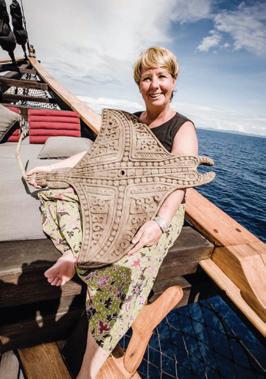


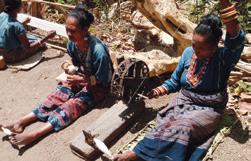
It is often when we least expect it, that strange and wonderful friendships and events occur. So it was that when Patti Seery Founder of Silolona Sojourns, first visited the remote Flores Archipelago and the Savu Sea, with its smoldering volcanoes, sapphire encrusted bays and a rich tapestry of unique cultures and rituals, almost 25 years to the day. A remote part of Indonesia, the peoples and cultures of Flores, Sumba and the Savu Sea hold a mystic trance over visitors, that lies deep in a history and friendship that has changed little since Silolona first sailed there. It was here, that Patti was so fondly welcomed long before other commercial phinisi’s sailed these waters, was adopted in full ceremonial ritual and given the name ‘Na’ Rajah’ by traditional tribal leaders – The ‘Lords of the Sun’. What followed was a close relationship that went far beyond business, as villagers welcomed Patti and Silolona’s guests, as their honored extended family. It is no surprise therefore, that any visit here with Silolona Sojourns, is guaranteed to be magical, offering a deeper level of travel, ceremony and kinship. Comprised of narrow rugged islands, strung between chains of active volcanoes, the landscape is nothing short of mesmerizing – almost untamed, undiscovered and alluringly scenic. Most of the
islanders here, live a relatively unchanged traditional life of farming and fishing. Living amongst some of the most magnificent coral reefs that hide stunning shoals of pelagic fish and rare marine flora. Some of the islands here notably Alor - still house ancient highly prized ceremonial bronze drums within the Abui Tribe – known as Moko’s which are traditionally given as dowries during tribal weddings. These intricately carved hourglass shaped bronze drums, are still today, used for ritual celebrations and as part of marriage exchange rites, conveying specific ‘status’ amongst members of the tribe. The Portuguese sailed here in the late 1500’s, in search of the regions rich colorful spices, leaving a strong imprint of Christianity upon the islands, which they called ‘Cabo des Flores’, or the Cape of Flowers, due to the mesmerizing beauty of the underwater coral gardens lining the bays. Today, it is these alluring underwater corals and hidden coves that, make it a diving mecca for those few in the
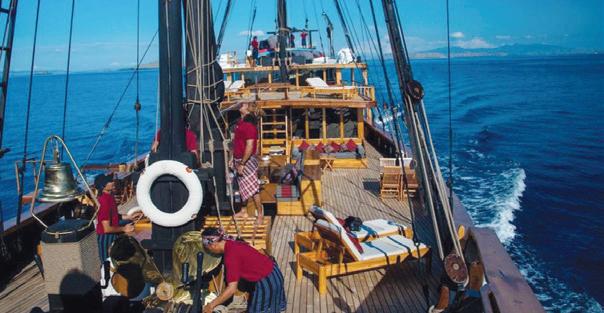
know. With its sheer remoteness few people travel this far, making it the perfect destination for Silolona Sojourns – renowned for their remote island explorations off the regular Indonesian tourist trails. Sailing majestically through waters dotted like a sapphire encrusted necklace, the gracious beauty of a traditional Indonesian phinisi ship such as Silolona, feels like she was built for such destinations. The north eastern coast of Flores, is home to the city of Maumere, where our journey really begins. Blessed with a picturesque landscape of lush green hills and rugged mountains, set against the translucent aquamarine ocean, Maumere once served as an alternative for intrepid travelers to Komodo National Park. One of its main draws are the remote local village’s home to some of the very best Ikat weaving communities. Ikat means ‘to tie’. The intricate threads are woven into elaborate patterns, then dyed, tied and dyed again, creating intricate unique designs. The best Ikat showcases ancient design elements -- rhomboids, knots an’d spindly creatures -- rendered in the earthy tones of natural dyes, usually the blood-red of Morinda citrofolia, known as ‘kombu’ in Indonesia, and the infamous blue black of indigo. What sets Iikat apart from mere decoration, is the depth of its meaning. Different symbols may
have an ancient history in Indonesian Ikat, like the eight-pointed floral motif ‘jilimprang’, descended from the patterns of India's art. Snakes, horses and a gruesome ‘skulls’ are also commonly found on Ikat material. In the more traditional villages of the Lesser Sundas, the design tells a complex tale of kingdoms and kinship, of maternal secrets and ancient cults. Handmade textiles here in the villages have great significance to Silolona Sojourns, with their Founder Patti Seery, both as an avid collector of Ikat,
as well as a learned expert on textiles in the region and their cultural significance having studied textile design years prior to Silolona voyages. Seery once sent Ikat to the Smithsonian Museum of Chicago, as part of her passion to share the textiles and cultures of the region she fell in love with to the world. Onboard Silolona’s phinisi’s, the importance given to this form of design are seen throughout the ships, adorning various parts of their luxurious interiors. Silolona’s concept of doing things differently and building bridges with local communities goes much deeper than the Ikat villages on this trip. With stops at PEKKA Lodan Doe, a grassroots women run community organization on the island of Adonara in
the East Flores regency of Eastern Indonesia. Adonara is isolated from other islands and this community plays a vital part in both female education and poverty eradication, as well as education on how to form communities, a valuable resource in a region prone to political strife. Heading onto the beach after a morning with this community, it is easy to reflect on the impact companies like Silolona have on local communities and vice-versa. Patti Seery was herself a strong independent woman who was seen by many through her work as a protector and promotor of various tribal cultures and traditions – keeping the past alive. A mother figure and advocate of women, tribal and ethnic rights. She was connected deeply with people wherever she went. It’s only natural therefore, that she would come across communities and organizations like PEKKA, bringing them into prominence and hi lighting the plight of communities they work, as well as their successes. The next morning we sail away, to the gently smoking yet spectacularly active volcano of Ili Api, spending the day leisurely under its watchful gaze. Standing alone in the middle of the sea, the Komba volcano belches and spews fiery boulders with elemental force, at regular intervals. Walking along the black sand beach, it is here that you can snorkel or dive amongst corals whose colors leap like gems sparkling against the back drop of the black sand. Idyllic textile villages line the thin rim around the base of the perfectly cone shaped volcano, which stares nonchalantly over the village. Spending a few days to explore and unwind here aboard the luxurious phinisi Silolona, is to step back in time, to a land which is raw, untamed yet magnificently beautiful from every vantage point, it is as though we really are in the middle of a paradisiacal dream. Waking up the next day, we set off for a morning’s dive in the ocean paradise of Alor, with its magnificent corals and abundant ocean life. Hiking to the village of Takpala, home to the Abui. Translated Abui means ’Mountain’, a distinct tribe with its own language, rituals and ceremonies literally living amongst mountainous volcanoes. Being welcomed by a ritual celebratory dance, it feels like we have somehow been here before. Their warm welcome feeling as though they are welcoming back old friends and long lost family. The Lego-Lego welcome dance is performed as soon as we step foot onto land, around a three-tiered circular stone called a ‘mesbah’. Local legend tells that the mesbah was built since prehistoric times to sacrifice human heads as the offering. As the women dance, we sit transfixed at their beautiful Ikat clothing, their jet black hair dancing with each graceful movement. Their ankles decorated, with jewelry that makes a musical like sound when moved. Coming together in a circle around us, the dance is a symbol of the strength of unity that is so fundamental to this part of Indonesia and the Abui culture. Though famous for their bronze drums as much as their textiles, their spectacular ‘Lopo’ houses with their long sweeping peaks made of thatched bamboo are as much an art piece as a place to lay one’s head. Designed in a pyramid shape, supported by six pillars made of red wood, built across three tiers, each with a specific purpose assigned to particular members of the house hold. Life here has changed here in thousands of years, giving our adventure a deep level of authenticity. Sailing to the tiny island of Savu the following day, stopping at remote megalithic villages literally clinging to the slopes of the
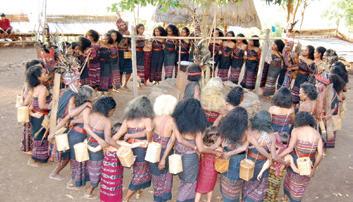

Patti Seery
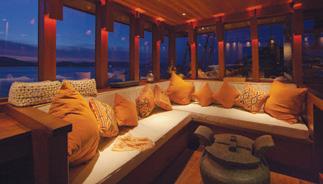
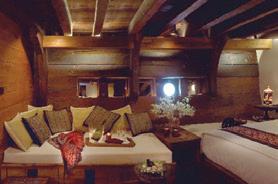
perfectly formed conned volcano – Gunung Inerie. This small yet incredibly bio-diverse sea, is home to spectacular marine life including; mantas and whale sharks. It was here that Captain James Cook once stopped in 1770, between triumphant and terminal visits to the Sandwich Islands, simply because of the landscape, the islanders' hospitality and the magnificence of the local palm wine, made from the Lontar palm. He noted the strictly observed kinship system of Savu and its abundance of religious leaders. "There are more rajahs on Savu than there are houses,’. In many ways, all these features represent a single worldview that we might call the Savu Way – of a kinship, governance, religion, lontar palms and of course Ikat. This particular journey ends in Komodo, where we explore the dramatic lush green backdrops of UNESCO protected Rinca. Home to its most famous inhabitant the Komodo dragon, who lives side by side with wild boars, water buffaloes and scores of rare colorful and endangered birds, found only in this part of Indonesia. Then it’s time to say goodbye - to the ocean, to nature, to the evocative tribes and textiles that have captivated us for a short period of time. Silolona Sojourns will be operating two special charter voyages in 2021 to this region. A special 16 night, 15 day charter and a shorter 10 night, 9 day voyage later this year. Isolated islands that have all but passed over by the changes that have swept Southeast Asia for the past thousand years, and are waiting for an intrepid few to explore them in the upmost luxury that is the phinisi ships of Silolona Sojourns. Silolona Sojourns can be contacted via Caroline Payen Silolona’s Yacht Charter Manager at; marketing@silolona.com







